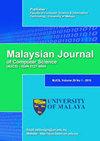STUDENT PERCEPTION STUDY ON SMART CAMPUS: A CASE STUDY ON HIGHER EDUCATION INSTITUTION
IF 1.1
4区 计算机科学
Q4 COMPUTER SCIENCE, ARTIFICIAL INTELLIGENCE
引用次数: 3
Abstract
With the current development of science and technology, big data technology, the Internet of Things (IoT), cloud computing, and mobile Internet in Malaysia, it is time for smart campuses to be established and Higher Education Institution (HEI) should not have left behind. The smart campus is the upgraded version of a digital university, providing a better academic environment to the lecturers and students. A smart campus enhances education, research, design, and delivering the appropriate higher learning modules to pursue the latest developments in ICT technology that can drive future educational growth and innovation. In short, the smart university is to construct a safe and secure, stable, environmentally-friendly, and energy-saving campus. However, so far, there is no standard smart campus concept to follows. This research paper evaluates the student's perceptions on the smart campus from the various application. A total of 912 students from local HEI have participated as valid observations for data analysis. The results show the students have selected 11 applications as high impact based on the Relative Importance Index for smart campus implementation. Future work could focus on the feedback from the staff and lecturers' points of view to propose a solid conceptual smart campus framework.智慧校园学生感知研究——以高等院校为例
随着马来西亚当前科技、大数据技术、物联网、云计算和移动互联网的发展,是时候建立智能校园了,高等教育机构不应该落后。智慧校园是数字大学的升级版,为讲师和学生提供了更好的学术环境。智能校园加强了教育、研究、设计和提供适当的高等教育模块,以追求信息和通信技术的最新发展,从而推动未来的教育增长和创新。总之,智慧大学就是要建设一个安全、稳定、环保、节能的校园。然而,到目前为止,还没有一个标准的智能校园概念可以遵循。本研究从不同的应用角度评估学生对智能校园的感知。共有912名来自当地高等教育学院的学生参与了数据分析的有效观察。结果显示,学生们根据智能校园实施的相对重要性指数,选择了11个具有高影响力的应用程序。未来的工作可以侧重于工作人员和讲师的反馈意见,以提出一个坚实的智能校园概念框架。
本文章由计算机程序翻译,如有差异,请以英文原文为准。
求助全文
约1分钟内获得全文
求助全文
来源期刊

Malaysian Journal of Computer Science
COMPUTER SCIENCE, ARTIFICIAL INTELLIGENCE-COMPUTER SCIENCE, THEORY & METHODS
CiteScore
2.20
自引率
33.30%
发文量
35
审稿时长
7.5 months
期刊介绍:
The Malaysian Journal of Computer Science (ISSN 0127-9084) is published four times a year in January, April, July and October by the Faculty of Computer Science and Information Technology, University of Malaya, since 1985. Over the years, the journal has gained popularity and the number of paper submissions has increased steadily. The rigorous reviews from the referees have helped in ensuring that the high standard of the journal is maintained. The objectives are to promote exchange of information and knowledge in research work, new inventions/developments of Computer Science and on the use of Information Technology towards the structuring of an information-rich society and to assist the academic staff from local and foreign universities, business and industrial sectors, government departments and academic institutions on publishing research results and studies in Computer Science and Information Technology through a scholarly publication. The journal is being indexed and abstracted by Clarivate Analytics'' Web of Science and Elsevier''s Scopus
 求助内容:
求助内容: 应助结果提醒方式:
应助结果提醒方式:


